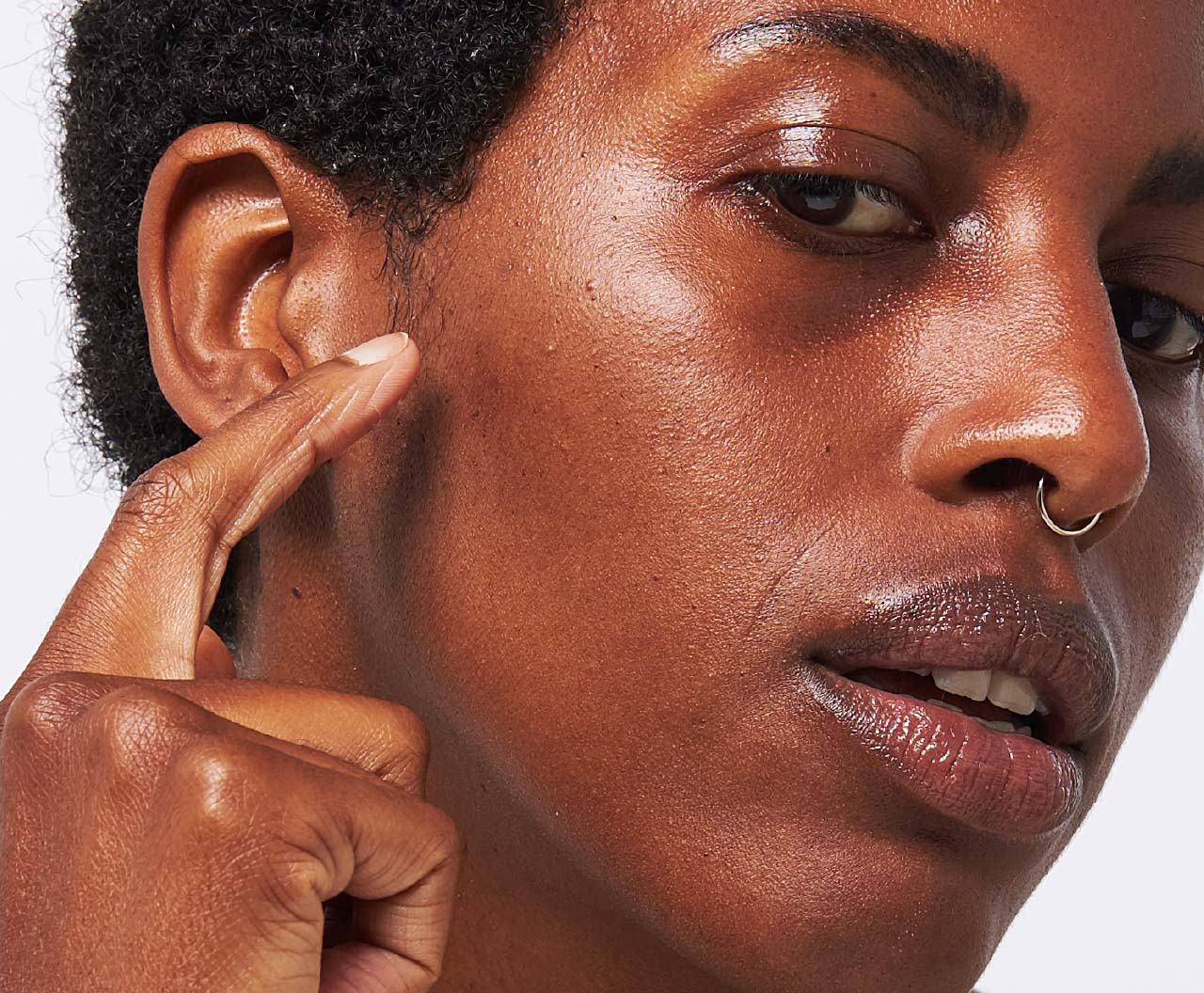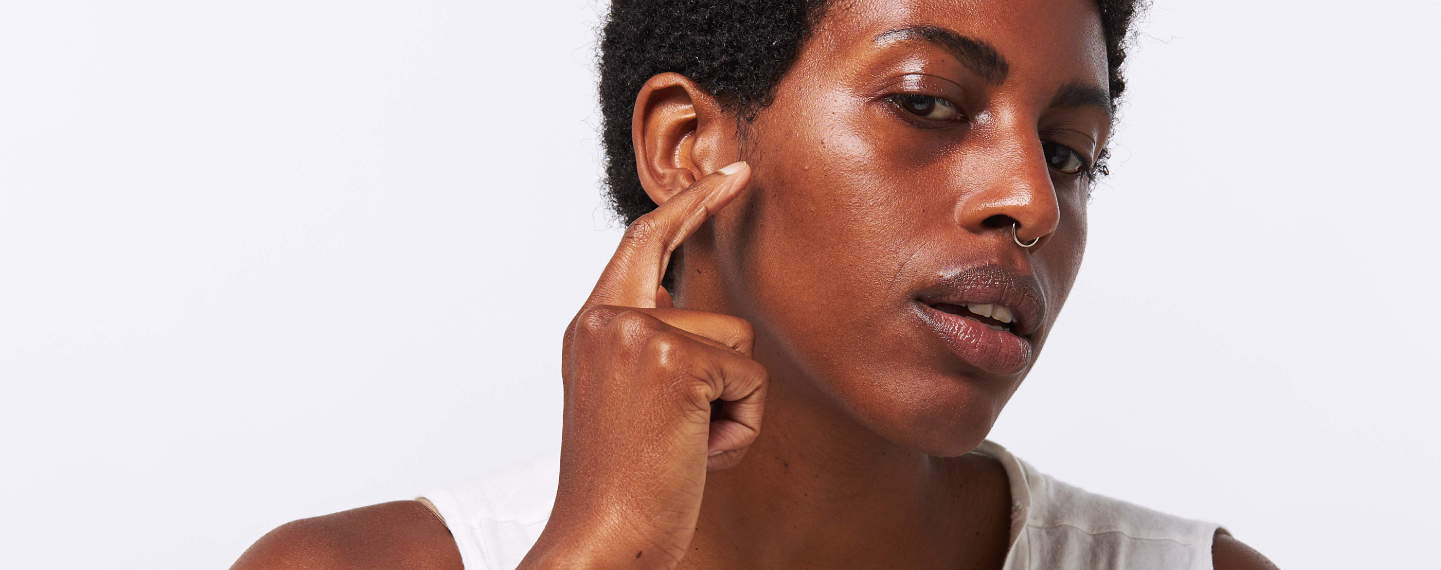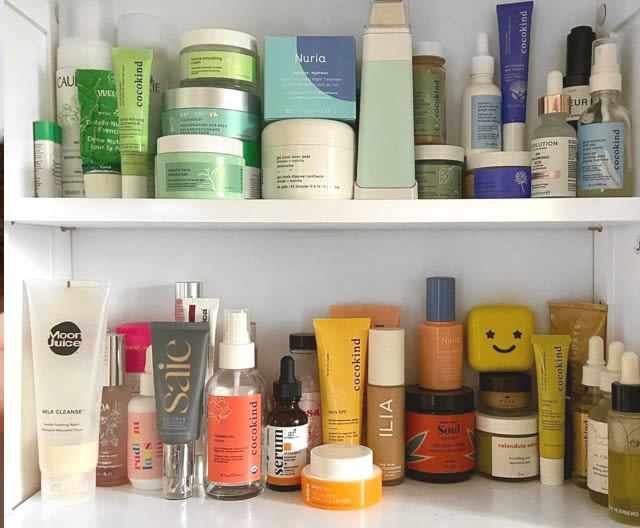Education
Is popping pimples bad?


SHARE
Education
Is popping pimples bad?
Medically reviewed by Kristin Hall, FNP
Written by Apostrophe Team
Last updated 4/1/2024
We all get acne, whether it’s a single pimple every now and then or persistent, severe breakouts that just never seem to totally go away.
We’ve also all had that moment when we looked in the mirror and got the urge. You know -- the urge to just give in and pop them all. After all, what harm can it do?
Although popping your pimples can feel tempting, it generally isn’t a good idea. Not only is it an ineffective way to get rid of acne, but it can often make your breakouts worse and increase your risk of developing difficult-to-remove acne scars.
Luckily, once you understand what causes acne, how it develops, and what causes it to worsen, controlling your breakouts and achieving clear skin becomes a lot easier, meaning there’s no need to even think about whether to pop your pimples or not.
Below, we’ve dug into the science behind acne to explain why pimple popping isn’t a good idea, as well as what you can do to treat acne, clear your skin, and prevent your acne breakouts from coming back in the future.
We’ve also explained what you can do to safely remove acne if you have a severe breakout that needs urgent attention.
Popping Pimples: The Basics
Popping a pimple can feel good, but it’s not recommended. When you pop a pimple with your fingers, you increase your risk of transferring bacteria to your face that can grow on your skin and inside your pores.
When bacteria multiply inside your acne, it leads to inflammation and makes your acne breakouts more severe and difficult to treat.
Popping your pimples may also increase your risk of developing acne scars. You could also make your breakouts worse by pushing the contents of the pimple deeper into your skin.
Instead of popping pimples, it’s best to treat your acne using science-based medications like benzoyl peroxide, tretinoin, clindamycin and others.
If you have severe pimples that you’d like removed, you can contact a dermatologist to have them professionally extracted using safe, sterile equipment.
How Pimples & Acne Develop
Acne forms when your hair follicles, or pores, become clogged due to a mix of sebum and dead, leftover skin cells.
Sebum is a type of oil that’s produced by the sebaceous glands -- tiny glands located under the surface of your skin. It’s essential for keeping your skin hydrated, lubricated, and protected from infectious agents such as bacteria and fungi.
Although sebum is important for your skin’s health and function, it can become a problem when it’s produced in excess.
When your sebaceous glands secrete too much sebum, the excess sebum can become clogged inside your pores.
Dead skin cells, which can collect on the surface of your skin as a result of cellular turnover, can also contribute to clogged pores.
Sometimes, the bacteria that grow on your skin can become stuck inside a clogged pore. When this happens, the bacteria may start to multiply inside the clogged pore, causing inflammation to develop.
Several different types of acne lesions can develop when your pores become clogged:
Comedones. These are the small whiteheads and blackheads that can develop on your face and body. They develop when a pore becomes partially or completely clogged with sebum and/or dead skin cells.
Inflammatory acne lesions. These papules and pustules form when your skin becomes inflamed due to the presence of bacteria. Papules and pustules (both often referred to as pimples) are common forms of inflammatory acne.
Nodular and cystic acne. These severe forms of acne develop deep below the surface of your skin. They’re often large and filled with fluid. This type of acne can be painful and often requires the use of medication.
Acne breakouts can vary in severity. While some people only get a pimple or two every now and then, others may be prone to recurring, difficult-to-treat breakouts of severe acne.
Why It’s Best Not to Pop Pimples
When you see a pimple, your first instinct might be to pop it with your fingers. Alternatively, you might take the more precise approach and reach for a needle or pair of tweezers to gently drain the contents and make the pimple less visible.
While this can feel like the right thing to do, it usually isn’t. Popping pimples is satisfying, but it’s also an easy way to accidentally damage your skin and worsen your acne.
Here’s why. When you pop a pimple, you’re attempting to do three things. The first is to remove the sebum, dead skin cells, pus, and other contents of the pimple. The second is to get rid of the bacteria. And the third is to stop your acne from getting worse.
Without the right technique, it’s surprisingly easy to accomplish the opposite of all three of these things.
First, by squeezing a pimple, you can easily push its contents deeper into your skin. This leads to increased inflammation that may make your acne breakouts more severe, painful, and difficult to deal with.
Second, when you try to pop a pimple, you create a risk of spreading bacteria from the pimple to other areas of your face, increasing your risk of developing more inflamed, infected acne.
You also risk spreading bacteria from your hands onto your face. Your hands are a major vector for infectious transmission, with research showing that your hands often harbor harmful bacteria that can affect your health and wellbeing.
This means that unless your hands are perfectly clean, there’s a real risk that popping a pimple with your hands could make your inflamed, infected acne worse.
Similarly, common household pimple-popping objects such as needles and tweezers are often covered in invisible yet harmful bacteria that, just like your hands, can cause infections.
Third, when you pop a pimple, it’s easy to accidentally spread its contents to other parts of your face and body. This may lead to more pimples forming on the surrounding skin and worse acne breakouts.
Finally, popping pimples can lead to severe inflammation, which may increase your risk of acne dark spots (post-inflammatory hyperpigmentation) and scarring.
While dark spots are treatable (a topic we’ve talked about in our guide to getting rid of acne dark spots), some types of acne scarring are near permanent and can only be treated through costly, intensive skin resurfacing procedures.
Because of these risks, unless you’re a trained expert in acne removal, it’s best not to squeeze or pop your pimples at home.
How to Treat Pimples & Acne
While popping pimples isn’t a good idea, there are numerous ways that you can treat your acne and keep your skin free of blemishes.
Over-the-Counter Products
If you only have mild acne, it’s usually possible to bring your breakouts under control and keep your skin clear with over-the-counter products. Try to:
Use a cleanser. Look for a gentle, non-comedogenic cleanser. Try to avoid cleansers that contain harsh ingredients, fragrances, and other substances that may irritate your skin. When you use a cleanser, use your fingertips to gently apply it to your skin. Once you’ve finished cleansing your face, carefully wash off the cleanser using warm water.
Apply benzoyl peroxide. Benzoyl peroxide is a medication that prevents acne-causing from multiplying. It’s a common ingredient in over-the-counter acne creams, cleansers, and other products. Since benzoyl peroxide prevents the growth of bacteria, it’s a good option if you’re prone to inflamed, infected acne. You can read more about benzoyl peroxide in our Benzoyl Peroxide for Acne’ guide.
Prescription Medications for Acne
If you have moderate acne, you’ll likely get better results by treating it using a prescription acne treatment. Prescription acne medications contain stronger ingredients and are formulated to get more severe breakouts and persistent acne under control.
Tretinoin is one of the most well-known acne medications available. Research has shown that it not only gets rid of existing acne lesions, but also that it helps to prevent new acne lesions from developing.
Similarly, clindamycin is a topical antibiotic that works by slowing down or stopping the growth of acne-causing bacteria.
These ingredients make it easier to get rid of acne breakouts and keep your skin free of pimples in the future.
If you have very severe acne, such as recurring, difficult-to-treat cystic acne, it’s best to talk to a dermatologist about your treatment options.
Depending on the severity of your acne, your dermatologist may prescribe oral medication such as isotretinoin. This medication is highly effective but can cause side effects and complications, meaning you’ll need to keep in regular contact with your healthcare provider during treatment.
Another option for treating acne is hormonal birth control. Several forms of the combination birth control pill are currently approved by the FDA as acne treatments.
Habits & Lifestyle Changes
Although changes to your skin care habits may not be enough to get rid of severe acne, taking good care of your skin can reduce your risk of developing acne breakouts. Try to:
Use your acne medication consistently. If you’re prescribed medication to treat acne, make sure to use it consistently. Many acne treatments may take three to four months to completely clear your skin of acne.
Wash your skin two times per day. Try to wash your skin first thing in the morning and just before you go to bed. It’s also important to wash your skin when you’re sweaty, such as after exercising.
Avoid skin care products that irritate your skin. Look for gentle products that aren’t made using alcohol or irritating ingredients. When you apply skin care products to your skin, use your fingertips, not a washcloth, and avoid scrubbing firmly.
Wash your hair regularly. The oil from your hand can easily make its way onto your forehead and cause acne breakouts. Wash your hair often, especially if you naturally have oily hair.
When you notice acne, resist the temptation to touch it. Instead, apply medication as prescribed and wait for it to clear naturally. This reduces your risk of developing an infection or accidentally making the acne breakout worse.
If You Need to Remove Severe Acne
Finally, if you develop severe acne that needs urgent attention, contact a dermatologist instead of trying to pop it on your own.
Dermatologists can safely remove acne using specialized, sterile equipment. Depending on the severity and type of your acne, a dermatologist may use several techniques to make your acne less severe.
One technique is to physically extract the acne. This involves using a sterile tool to remove the contents of your pores. The dermatologist will look at your affected pores under magnification, then carefully remove the contents using a sterile technique to prevent infection.
This technique is often used to remove large comedonal acne lesions, such as whiteheads and blackheads.
Another technique involves injecting your acne with corticosteroids -- medications that lower the level of inflammation in your skin.
The dermatologist may use this technique if you have inflamed, infected acne, such as nodular or cystic acne. For severe acne, the dermatologist may drain the contents with a needle or by carefully opening the lesion with a surgical instrument.
Make sure to carefully follow your healthcare provider’s instructions after having acne removed, as your skin may feel sensitive for several days.
In Conclusion
As tempting as it might feel, popping your pimples isn’t a good idea. When you pop a pimple on your own, you increase your risk of infections, worse breakouts, and lasting issues such as acne scarring.
If you have acne, it’s far better to use science-backed acne treatments than to pop your pimples after they develop.
Our guide to acne treatment options goes into more detail about the science behind getting rid of acne, as well as the most effective over-the-counter and prescription medications for getting your breakouts under control and keeping your skin blemish-free.
References
Pimple Popping: Why Only a Dermatologist Should Do It. (n.d.). Retrieved from https://www.aad.org/public/diseases/acne/skin-care/popping
Edmonds-Wilson, S.L., Nurinova, N.I., Zapka, C.A., Fierer, N. & Wilson, M. (2015, October). Review of human hand microbiome research. Journal of Dermatological Science. 80 (1), 3-12. Retrieved from https://www.sciencedirect.com/science/article/pii/S0923181115300268
Matin, T. & Goodman, M.B. (2020, November 24). Benzoyl Peroxide. StatPearls. Retrieved from https://www.ncbi.nlm.nih.gov/books/NBK537220/
Leyden, J., Stein-Gold, L. & Weiss, J. (2017, September). Why Topical Retinoids Are Mainstay of Therapy for Acne. Dermatology and Therapy. 7 (3), 293–304. Retrieved from https://www.ncbi.nlm.nih.gov/pmc/articles/PMC5574737/
Clindamycin Topical. (2016, October 15). Retrieved from https://medlineplus.gov/druginfo/meds/a609005.html
10 Skin Care Habits That Can Worsen Acne. (n.d.). Retrieved from https://www.aad.org/public/diseases/acne/skin-care/habits-stop
Acne: Tips for Managing. (n.d.). Retrieved from https://www.aad.org/public/diseases/acne/skin-care/tips
Sutaria AH, Masood S, Schlessinger J. Acne Vulgaris. [Updated 2020 Aug 8]. In: StatPearls [Internet]. Treasure Island (FL): StatPearls Publishing; 2021 Jan-. Available from: https://www.ncbi.nlm.nih.gov/books/NBK459173/
Like what you just read? Sign up for our email list to get the scoop on skincare science delivered straight to your inbox.

Education
What is milia?
What is milia? Today, we’re jumping into one type of bump that you may have heard about most commonly in infants — milia.
Read More
Education
Best moisturizer for acne-prone skin
If you have combination acne-prone skin, figuring out which moisturizer is best for your skin might be tough. In this guide, we break down the best moisturizer for combination, acne-prone skin.
Read More
Education
How to build a face care routine
As you get into skincare, it might seem overwhelming, especially trying to figure out the order you're supposed to apply products in. Below, we detail how to build a face care routine for your skin!
Read More
